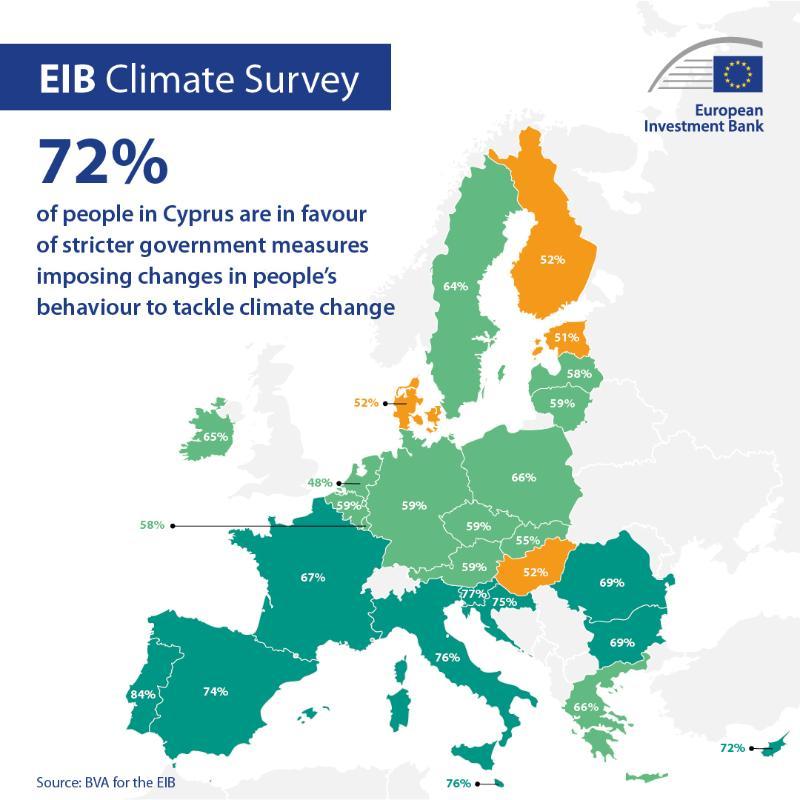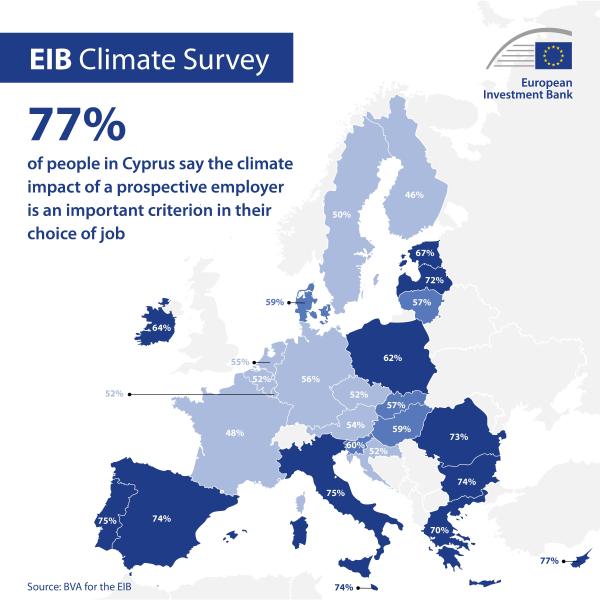
The second part of the 2022-2023 European Investment Bank (EIB) Climate Survey explores people’s views on climate change in a rapidly changing world. The results from this release focus on people’s individual behaviour and the actions they are taking to combat climate change.
- 83% of Cypriots under 30 say the climate impact of prospective employers is an important factor when job hunting, and 25% say it is even a top priority.
- 62% of Cypriot respondents would be in favour of a carbon budget system to set a cap on the most climate-damaging consumption (59% of people under 30).
- 60% of Cypriots say they would pay more for climate-friendly food.
- 85% of Cypriot respondents are in favour of labelling all food to help limit the impact on climate and the environment.
- 72% are in favour of stricter government measures to impose a change in personal behaviour (79% of people under 30).
These are some of the results from the latest yearly EIB Climate Survey, conducted in August 2022 and published today. The EIB is the lending arm of the European Union and the world’s largest multilateral lender for climate action projects.
Individual behaviour and stricter government measures
The war in Ukraine and its consequences, including rising energy prices and inflation, have dramatically increased concerns about declining purchasing power in Cyprus. Nevertheless, climate change remains one of the top three challenges for the country, according to Cypriot respondents. Nearly three-quarters (71%) say they are convinced that their own behaviour can make a difference in addressing the climate emergency.
Women (80%) and young respondents under 30 (78%) are the most convinced that their individual behaviour can have an impact, compared to men (62%) and people over 30 (69%).
For many, the government has a role to play in encouraging individual behavioural change. A majority of Cypriots (72%) would be in favour of stricter government measures imposing a change in people’s behaviour to tackle climate change (79% of respondents under 30 would welcome such measures).

Jobseeker priorities
A growing number of people entering the workforce each year are looking at employers’ climate credentials when job hunting. Most Cypriot respondents (77%) say it is important for prospective employers to prioritise sustainability. For 20% it is even a top priority. Of people under 30 — typically those looking for their first or second job — more than three-quarters (83%) say that sustainability is an important factor in their choice of employer, and 25% say it is a top priority.

Capping individual consumption
A majority of Cypriot respondents (62%) say they would be in favour of a carbon budget system that would allocate each individual a fixed number of yearly credits to be spent on items with a big carbon footprint (non-essential goods, flights, meat, etc.). Italian participants share this opinion in the same measure (64%), while 57% of Greek and Maltese respondents say they would welcome such a system.
It is noteworthy that a majority of Cypriots favour this measure regardless of income (62% of lower-income respondents, 62% of middle-income respondents, and 64% of higher-income respondents).
Food labelling and pricing
Food production accounts for a significant share of greenhouse gas emissions. To help people make more sustainable choices when grocery shopping, 85% of Cypriots are in favour of labelling all food products with their climate footprint. This is similar to the rate in Greece (82%), but 8 percentage points above the rate in Croatia (77%).
In addition, 60% of Cypriots say they would be willing to pay slightly more for food that is produced locally and more sustainably (similar to the rate in Greece, with 59%, but 9 percentage points below Croatia, with 69%). This willingness to pay more for food spans all income groups.
Reducing the consumption of meat and dairy products would be another efficient way to limit greenhouse gas emissions. Well over half of Cypriots (58%) would be in favour of limiting the amount of meat and dairy products that people can buy (slightly more than Greeks, with 54%, but 9 percentage points above Croats, with 49%)
While this figure spans all income groups, there is a clear generation gap, with 62% of people over 30 in favour of capping individual consumption of meat and dairy products, as opposed to only 47% of those under 30.
In the words of EIB Vice-President Lilyana Pavlova, “The outcome of the EIB Climate Survey shows that Cypriots are more than willing to help fight climate change at the individual level. As the EU climate bank, we welcome this commitment. It is our role to enable people to take action against the climate crisis. We do this by financing green services such as sustainable transport, renewable energy and energy-efficient buildings. In 2022, we signed a €150 million urban regeneration project that aims to make Cypriot municipalities greener, boost the economy, and improve people’s lives. This operation made up 60% of all EIB financing in Cyprus in 2022. It was supplemented by a major technical advisory assignment funded by the EIB to facilitate the implementation and help identify additional future green investments. We will continue to support projects and initiatives that accelerate the green transition through our financial and advisory services, and are looking for innovative ways to contribute to a prosperous future that leaves no one behind.”
Background information
About the EIB Climate Survey
The European Investment Bank (EIB) has now performed the fifth annual EIB Climate Survey, a thorough assessment of how people feel about climate change. Conducted in partnership with the market research firm BVA, the fifth edition of the EIB Climate Survey aims to inform the broader debate on attitudes and expectations in terms of climate action. More than 28 000 respondents participated in the survey in August 2022, with a representative panel of people aged 15 and above for each of the 30 countries polled.
About the European Investment Bank
The EIB Group has adopted a Climate Bank Roadmap to deliver on its ambitious agenda to support €1 trillion of climate action and environmental sustainability investments in the decade to 2030, and to deliver more than 50% of EIB finance for climate action and environmental sustainability by 2025. As part of the roadmap, all new EIB Group operations have been aligned with the goals and principles of the Paris Agreement since the start of 2021.
EIB Global is the EIB Group’s new specialised arm devoted to increasing the impact of international partnerships and development finance. EIB Global is designed to foster strong, focused partnerships within Team Europe, alongside fellow development finance institutions and civil society. EIB Global brings the Group closer to local people, companies and institutions through our offices around the world.
About BVA
BVA is an opinion research and consulting firm recognised as one of the most innovative market research firms in its sector. Specialised in behavioural marketing, BVA combines data science and social science to make data inspiring and bring it to life. BVA is also a member of the Worldwide Independent Network of Market Research (WIN), a global network of some of the world’s leading market research and survey players, with over 40 members.